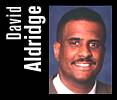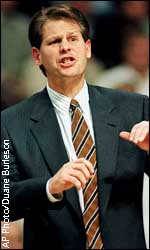
| ||||||||||||
| ALSO SEE Ainge resigns as Suns coach; Skiles takes over Barkley released from hospital two days after surgery  Aldridge: Odom talks, plays like veteran Aldridge: Odom talks, plays like veteran | ||||
| ESPN.com NFL | ||||
 | Sunday, December 19 Ainge's sudden life change for real Special to ESPN.com | |||
Jerry Colangelo was watching his Phoenix Suns play in Dallas last Saturday night, when something troubled him. He picked up the phone and called his son, Bryan, the team's president.
"I had sensed a change in his persona," Jerry Colangelo told me Tuesday morning. "Saturday night, when we lost in Dallas, I said 'Bryan, I'm looking at Danny, his facial expression and his body language. And if I didn't know any better, I'd say he's throwing it in.' " | |
| Ainge stepped down to devote more time to his wife and six children. |
My NBA died last Wednesday in Philadelphia, when Charles Barkley blew out his knee and left the floor for the last time. This is not to say there aren't young, exciting superstars in the league. There are. Kevin Garnett. Allen Iverson. Tim Duncan. Shaq. Kobe. And this is not to say there aren't any number of old pros still kicking around. There are. Stockton. Malone. Robinson. Richmond. Ewing. But Barkley was the last of that '80s group that truly got it. He understood better than anybody that you could have a profane conversation with a writer one day and that it wouldn't be held against you the next night. He understood that a reporter with a full notebook was a happy one. Ask him a question, you got an answer. It might not be well thought out. It might not be the same answer you'd get the next night. But you'd get one. None of this hiding out in the trainer's room. So when Barkley limped into an interview room at the FleetCenter for what would be our Sunday Conversation last Friday, he wasn't the only melancholy one. "Can't drink after midnight," he said, clutching a longneck. Surgery was the next morning, in Houston. "Gotta get it all in." He was on the bench for his team's game with the Celtics, but he really wasn't there emotionally. "It's been a hard day, because I know they're leaving me, and I'm not going to see them for a long time," he started. "Normally, when you sit out a game, (you say) 'well, I'm going to be back. Soon.' But now, you think about it all day and during the game. I'm like, 'I'm not going to be back soon.' And that's hard ... I know I'm not going to play anymore. And you have to compound that, when you have to say goodbye to your teammates." We talked about a lot of things. His toughest opponent. (He hasn't wavered in 10 years on this. Kevin McHale.) His favorite teammates. Politics. (He doesn't hold out much hope for the Reform Party.) Race. Sex. Scottie. ("I've never said a bad word about Scottie," Barkley said. "Scottie said something bad about me.") The usual dinner plate of BarkleySpeak. He's come around a bit on the role model debate. "I think athletes are role models," he told me. "But it all comes back to your parents. And until people understand that and accept that, we're always going to have problems. I wish every little kid could make it in a professional sport, but that's unrealistic. But I want kids to listen to their parents. In the commercial, I challenged the parents to be better role models and better parents. I think for me personally, it's a big deal to be a father. "Obviously, I've had a strained relationship with my father my whole life. And that, more than anything, changed my perception of me and my daughter. I know that I did not want to have the type of relationship that me and my father had. But I wanted to be a great father. And I think I will become a great father. I think I'm a good father now. But I realize that once basketball is over, that will give me the opportunity to be a great father." He disclosed that he brokered a meeting 10 years ago between himself, commissioner David Stern and referee Mike Mathis to try and end the feud between himself and the official that went on another decade. With no successful resolution. "I think it's important for people to realize that in sports, whether it's baseball or basketball, the two most prevalent sports, there are some officials that hold grudges," he said. "And that's not fair ... when (Mathis) went to jail (as one of the officials involved in the referee's income tax evasion scandal), I called him. I said 'Listen, even though we've had our problems, and I'm not a big fan of yours, I don't want anybody to go to jail.' It disappointed me that he never let the grudge go." (I tried to reach Mathis for comment on this. Unsuccessfully.) Barkley said he'll rehab by himself, without his wife, Maureen, or his daughter, Christiana, in town. "I've had major injuries before, and it's a miserable time," he said. "It's so tedious. The only thing that's funny is that you think you're a big, strong guy. I remember when I tore my rotator. You think you're a big, strong guy, and the first day, you can only lift one pound. And the next day, you can only lift two pounds. And you think, 'I have to do this for three or four hours a day?' And it's just a miserable time, and I don't want anybody else miserable around me." It was fitting that his last public appearance, for a while, was in Boston. There were the usual video tributes to Barkley's career, and there were, no joke, hundreds of Celtics fans who walked up to him during the game just to tell him how much his play was appreciated. That's why Barkley flew to Boston and put off his surgery two days. "I realize that Bill Russell is 10 times as good a player as I'll ever be, and I know that I make more in one year than he made in his entire career," Barkley said. "But I know I have an obligation to him. I have an obligation to Oscar Robertson, John Havlicek, Dave Cowens, Dr. J., Moses. I have an obligation to those guys to take the spirit of the game forward." I have so many favorite Barkley memories. But two stand out. One was in Barcelona, during the 1992 Olympics. The Dream Team was in full flower, and its members were at the height of their powers. Every night, thousands of locals and tourists walked down a boulevard in downtown known as "Las Ramblas." You saw anything and everything on the Ramblas. Yuppies and bums; actors and addicts. And, most nights, Charles Barkley. No entourage. No bodyguard. Keep in mind, the rest of the team was sequestered at a local hotel, with armed guards out front to keep the non-stars from coming in. And there, amidst the masses, walked Barkley. Chasing the night, looking for fun. The other memory came a year later, late in the Phoenix night. The Suns had just lost the NBA Finals to the Bulls in heartbreaking fashion, blowing a four-point lead in the last 45 seconds. No one was more crestfallen than Barkley, who wanted so badly to win the championship that would finally silence his critics. But the Bulls wouldn't allow it. After filing our late stories, a few of us (then) sportswriters gathered at a restaurant for a late dinner, when who should pull up but Barkley. He couldn't go home, he said. He was still reliving the game's final moments. He sat with us for a few minutes, and while we started the visit trying to cheer him up, by the time he got up and left a few minutes later, he had us in stitches. Most of what he said I cannot repeat in a family online column. Which was the great Barkley Contradiction. If you weren't there, and you just read his words in print, you'd likely come to a much different conclusion about his malevolence than if you were standing two inches from him. He was funniest at his most profane. If you weren't there when he taunted Manute Bol about hunting dinner with a spear, you wouldn't find it nearly as funny as I did, who was there. He was the damn life of the party. I told him this after we finished talking, and I say it now. Thank you, Charles. It's been one hell of a ride. Where will he go?
Despite the Nuggets' (for them) decent start, Ron Mercer hardly sounds like a guy who's planning to stick around and be part of the team's future.
|
THE TOP 10 1. L.A. Lakers 2. Miami 3. Portland 4. San Antonio 5. Utah 6. Sacramento 7. Indiana 8. Seattle 9. Phoenix 10. Charlotte
THE BOTTOM FIVE |
Quote of the Week
"Well, he's really tight with the Pearl Jam guys."
-- Sonics VP Wally Walker, musing on Dennis Rodman's possible motivation
for starting the preposterous rumor that he'd soon be playing in Seattle
with the Sonics.
|
ESPN INSIDER
Copyright 1995-99 ESPN/Starwave Partners d/b/a ESPN Internet Ventures. All rights reserved. Do not duplicate or redistribute in any form. ESPN.com Privacy Policy. Use of this site signifies your agreement to the Terms of Service. | ||||